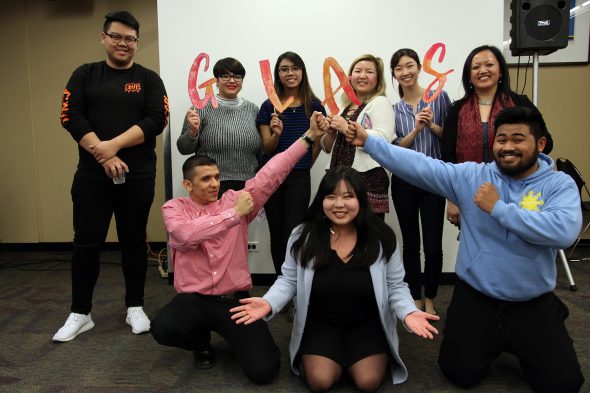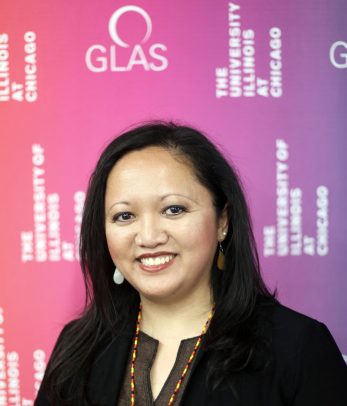UIC announces newly created global Asian studies major
For the first time this fall, University of Illinois Chicago students can major in and earn a Bachelor of Arts degree in global Asian studies in the College of Liberal Arts and Sciences. The program engages in an interdisciplinary study of Asia and transoceanic and transnational Asian diasporas and is the first of its kind in the Midwest.
The aim of the GLAS program is a better understanding of the globalized world and to redress some of the shortcomings of a limited focus on either area studies (Asian studies) or ethnic studies (Asian American studies) alone.
Global Asian studies also includes a study of new immigration patterns and historical shifts in the U.S. and globally. These include an emphasis on anti-Asian, anti-Black and anti-Arab/Muslim racism.
The idea for the program began more than 30 years ago when students pushed UIC to offer more courses related to Asian American issues and more representation on campus.
Since 2010, UIC has received Asian American and Native American Pacific Islander-Serving Institutions grants from the U.S. Department of Education’s Minority-Serving Institutions program. AANAPISI grants have helped support the growth of GLAS. Currently, 21% of UIC’s overall student population is Asian.
A celebration and panel discussion, “GLAS Major Takes (F)light: Paying Tribute to a 30-Year Movement,” involving alumni and community members will be held Oct. 7, 4-6 p.m., in the Cardinal Room, Student Center East, 750 S. Halsted St.
Anna Guevarra, the founding director of GLAS and a co-principal investigator of the UIC AANAPISI Initiative at UIC, will lead the discussion.
She recently spoke to UIC today about the program and her work.
Can you discuss the major and the thinking behind its development as an independent major?
The BA in global Asian studies provides students with an interdisciplinary perspective on the study of Asia and transoceanic and transnational diasporas. The major draws from the humanities, social sciences and the arts and prepares students for a critical analysis of Asian and Asian American history, politics, economy and culture with a curriculum anchored by intersectional social justice frameworks. It is the first degree-granting program in Illinois that uniquely offers curricular content that draws from Asian studies and Asian American studies.
How does the major fit in the Global Asian Studies Program?
The Global Asian Studies Program developed following a merger of Asian American studies and Asian studies with the intellectual and pedagogical mission of addressing our social worlds and dissolving the artificial boundaries between these two fields. The major provides a curricular arm for understanding these dynamics and prepares students to engage and critically understand the globalized world in which we live. This also includes a study of new immigration patterns and historical shifts in U.S. and global racial formations, such as Islamophobia and anti-Arab/Muslim racism, among other issues.
Can you discuss the history leading to the new major?
In 1991, students began to rally for an Asian American studies program and formed the Asian American Collegiate Organization. In 2010, after years of maintaining pressure, the administration established the Asian American studies program and minor. At the same time, UIC received the first five-year AANAPISI grant that designated the campus as a Minority-Serving Institution. Three years later, the Asian American studies and Asian studies faculty began to meet to explore a merger. Coupled with faculty hires made through the Chancellor’s Cluster Initiative that enabled the growth of the program, this eventually led to the formation of the Global Asian Studies Program in 2016. This fall, the first cohort of students will be welcomed by a program that has 5.25 FTE (full-time equivalent) faculty, several affiliated faculty members, a Bridge to Faculty postdoctoral researcher, a curriculum that is critical, intersectional and comparative in its approaches and engaged with the community. Most importantly, the first cohort of students will learn about and benefit from the long legacy of student activism that built this program, as captured by these milestones.

What need does it fulfill for students, and how many students are in the cohort?
The BA in global Asian studies fulfills a longstanding demand from students to major in a field of study that speaks to their lived experiences and histories. It provides a culturally relevant curriculum that gives students the analytical tools to frame and contextualize these experiences and place them within longer histories and more complex geographies and politics. This need has also been recognized by the state with the passage of the Teaching Equitable Asian American Community History Act, which mandates the teaching of Asian American histories in public schools. GLAS is currently beginning an AANAPISI-funded high school to college pipeline initiative, which will also strengthen and extend the reach of this legislation and potentially increase the number of majors and minors in GLAS. From the minute we announced the major, students have declared it, so we expect to see a continuing upward trajectory.
What can students expect as part of the major?
Students will have an innovative curriculum anchored by three thematic areas: empire, migration and diaspora; culture and the arts; society, politics and the state. The students will learn from and work with award-winning and dedicated faculty whose expertise represent the fields of American studies, anthropology, art history, communication, criminology, law and justice, education, English, ethnic studies, gender and women’s studies, history, linguistics, political science and sociology. They can expect a curriculum rooted in the community where students can engage in research or work as interns in community organizations. They can expect to gain research skills that will prepare them to work and thrive in today’s diverse and globalized world. They can expect to be part of a program committed to building community and maintaining a strong student-centered focus. They can expect to be welcomed by a student advisory board or even be invited to become part of it.
Tell us about your work in Uptown and how it relates to the new major?
My work in Uptown began with the Dis/Placements: A People’s History of Uptown project that I co-founded with Gayatri Reddy. This is a collaborative, digital, public history project that traces stories of everyday peoples’ resistance in the wake of urban “development” in the North Side Chicago neighborhood of Uptown. Uptown has long been a portal for working-class people, immigrants and refugees, including those from Southeast Asia. The project explores the multiracial solidarities and movements that developed in response to multiple displacements that people experienced, and the ways that they fought back and built resilient communities. The project helps to understand the histories that produced these migrations and places Asian Americans’ lived experiences concerning experiences of other racialized, poor and marginalized communities as they navigate struggles around education, housing, health care and access to human services. In other words, this project is very much in keeping with the goals of the GLAS program and major, providing one among other faculty-led projects that students can engage with to see how these global and local histories and politics intersect and play out in the context of Chicago.
For more information about the Global Asian Studies program, contact glas@uic.edu.
RSVP online to the GLAS Takes (F)light: Paying Tribute to a 30-Year Movement event.

